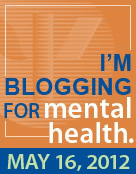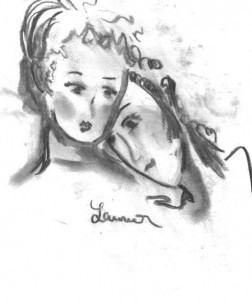Julie A. Fast's Blog, page 75
May 25, 2012
Does Your Partner Have Bipolar Disorder? You are Not Alone.

Group Coaching Calls for Partners of People
with Bipolar Disorder
“When I went into this relationship there were two people, now bipolar disorder makes it feel like there are three.”
Does bipolar disorder negatively affect your relationship? You’re not alone if it does. Bipolar disorder is notorious for creating relationship problems. It’s also easy for you to get lost when a partner is ill.
Are you interested in the following topics?
Communicating with your partner during mood swings.
Sex. (Just one word and yet so complicated!)
The complex world of medications.
Lack of insight or refusal of the diagnosis.
An end to caretaking.
Successful bipolar disorder management.
Then this coaching call is for you. Whether your relationship is doing well, but you need more bipolar disorder tips or your relationship is currently controlled by the ups and downs of the illness, I will show you how to improve your relationship forever. The calls will also answer these questions:
Will my partner get better?
Is bipolar disorder going to ruin our relationship?
Will my partner ever accept the bipolar disorder diagnosis?
Will my partner ever learn to manage this illness successfully?
Will my partner find the right medications?
When will my life be important too?
About the calls: There are two calls in the series. The first focuses on the problems, challenges and questions you, as a partner may have about bipolar disorder. The second call is 100% focused on strategies you can use to create a loving and stable relationship.
These calls are personal advice and strategies for immediate use from someone who knows exactly what you’re going through. My goal is to help you create a relationship that is based on love and serenity and not one focused on bipolar disorder mood swings.
Never forget. Knowing how to help your partner is not innate. It helps to learn proven strategies from someone who has been on both sides.
If you have worked with me or currently work with me as a coaching client, these calls are a great refresher. If you are new to my work, welcome!
Ordering details are below.
Julie
2-Part Coaching Call for Partners- $97 (Less than $50 per hour!)
Two Tuesdays: May 29 and June 5, 2012.
5:30 PM Pacific Time (8:30 PM East Coast)

z
Related posts:
Newsletter: A letter from a partner of a person with bipolar disorder pt 2……..
Loving Someone with Bipolar Disorder: Understanding and Helping Your Partner
Accepting New Family and Partner Coaching Clients
May 24, 2012
What is manic pressured speech? Why can’t I stop talking!!!
I recently wrote a blog post for BP Magazine on the topic of talking too darn much when you’re manic. I know what it feels like from both sides. I’ve talked so much I’ve worn myself out and I recently went through a friend’s manic episode where she was talking so fast- and her flight of ideas were out of control- I couldn’t keep up!
“Julie, I’m not manic. Am I manic? ‘Im going to walk it off. I just got up this morning- well I didn’t really sleep- but I got up and took an hour power walk and then I went to the gym and swam for two hours. Do you think that exercise will cure this mania? I do! I think it can. I’m just going to keep walking and walking and get better that way.”
You can’t get a word in. When you’re manic, you try to hard not to talk! But sometimes you can’t help it. Here is my post from BP Magazine.
Talking Over People When You’re Manic
Please leave comments on the post. I know that people get so much out of reading about other people’s experiences!
Julie
I highly recommend BP Magazine. The information is educational, interesting, has my column! and the price is right.
Related posts:
Bipolar Mania: Pressured Speech
Bipolar disorder manic/mania/hospital!
Are you Manic Julie! I think you’re MANIC!
May 22, 2012
Bipolar Disorder Anxiety and Coffee
 I Love Coffee- but my anxiety hates it…
I Love Coffee- but my anxiety hates it…
Why does caffeinated coffee taste so good? I am not someone who likes caffeine. It actually makes me feel quite awful. But I love the taste of coffee. I know that I should only have decaf. It tastes ok and doesn’t make me anxious. Actually, it often tastes awful!
Regular coffee just tastes SO much better. I find that I let my guard down in order to have real iced coffee. Not the decaf Americano iced coffee, but the kind of coffee that is cold brewed and wonderful. And it’s only available as regular coffee.
Is it worth it? No. It takes at the most 20 minutes to sit and drink an iced coffee while I work. I can then have HOURS of anxiety from just one drink. In fact, once the anxiety starts, it can affect me all day. I know that if I have an iced coffee about once a month, and I have it on a day where I’m not anxious, I can handle it. But if I drink coffee a few times a week, the caffeine accumulates in my body and my anxiety gets much, much worse.
My coauthor Dr. John Preston always tells his clients to carefully watch their caffeine consumption. I have to agree with him. For those of us with anxiety, no caffeine is the ONLY way to go. My friend Sherri is on Zyprexa and if she makes the mistake of having regular coffee, the caffeine and Zyprexa interact and make her really anxious and shaky. Also, be careful at the coffee shop. Starbucks has messed up my decaf order many, many times. I always know if it’s real coffee though- by the taste! I take it back and say, “Are you sure this is decaf?” And they will say, “No! I missed that one.” Just great.
Are you anxious? Do you drink coffee? Switching to decaf is not that hard. You just have to give up some taste to reduce your anxiety. I prefer the lower anxiety.
Julie
Related posts:
It’s 2 AM!!!!!!
Blog Reader Question on Bipolar Disorder and Anxiety
Bipolar Illness treatment….
May 21, 2012
Wow! Look at those shoes!
When I have a lot of mood swings- managing bipolar disorder becomes my job. Everything I do has to be examined- will this help me get better? Will this make me more ill?
It’s hard. I just want to be a person who gets up, works, sees friends and family, has fun and goes to bed. That is my dream! I have lived it a few times.
When the bipolar comes back,  I have to be ready for it.
I have to be ready for it.
This afternoon, I saw a nice looking woman who was in her 50′s walking down the street. She was very well dressed. The well part of me thought, “Wow, those are great shoes!” The sick part of me thought, “What is the point of even looking at her shoes, we will all be dead eventually.”
It takes a lot of work to have conflicting thoughts like these- you have to know what is real and what is ridiculous! Managing bipolar is my job when I’m sick. I do it 24 hours a day until I’m better.
Julie
A guy I know named Elijah painted these amazing shoes!
Related posts:
Mini Newsletter: Mania Story
No Drama Bipolar Lifestyle
May 19, 2012
My Daughter Has Bipolar Disorder. Can you help?
Hi, I just received this comment about a presetation I gave to NAMI (National Alliance on Mental Illness) a few weeks ago.
Julie. . . .we attended your speech in Eugene, Oregon on Thursday night. My daughter is having a hard time right now and any little “light” that she can see is SO important, so you can imagine how important it has been for her to be exposed to your hopeful messages. the time you took to speak to us afterwords was invaluble. When we were in the car she said, “Julie wasn’t ashamed- she just stood up there. “ I can’t thank you enoug for the time that you took to speak with us afterward! We bought the Health Cards. Haven’t had time to look at it yet, but WILL. Many thanks. Rebecca.
**
When I meet wonderful people at my talks, I’m always happy to see mothers and fathers with their child. There is so much fear, worry, and a desire for education in these parents. I always feel good when I can chat with them. I have been there and my mother has been there. I have also been there as a sister, so I do understand the family connection. It’s different than a connection between a partner or friend.
Often the children are a bit stunned looking as they are in a crisis or just got out of the hospital. I can tell if someone is on a high dose of anti psychotics or if they are just worn out from a bad episode. I can also usually tell if someone has attempted suicide. Nothing surprises me as this is an illness with very set behavior. We all act the same when we have bipolar disorder- because it’s an illness.
Seeing the children reminds me of myself over the years and of what my mother has been through. But I’m always positive. If I can stand there helping them after all of these years of hell and fear, then they can do the same. There were many, many years I didn’t think I would make it, but I did. Bipolar disorder is a treatable illness.
When parents get out with their children and look for help, their child’s chance of stability grows and grows. We do get better. Yes, it’s a life long illness at this time- but these guys are young and I really believe better treatment is coming in the future as we learn more about the genetics of bipolar disorder.
If you as a parent have the Health Cards and your child is still ill, do the cards yourself and then use them with your child when they are more stable. A child with bipolar disorder needs so much love and support. There is no one more important in life than my mother, so it means a lot to me to see parents when I speak!
Julie
PS: Thanks for your kind words Rebecca!
**
This is an example of a newsletters from BipolarHappens.com. The newsletter sign up is on the right menu.
Related posts:
Bipolar Disorder and School
Bipolar Disorder and Work Problems
A Note on the Health Cards Treatment System for Bipolar Disorder
May 17, 2012
Must Read Article: Researchers Crack Codes for Lithium, Electroshock
This is really exciting news about bipolar disorder treatment. I haven’t heard anything new treatment wise in a long time! I take lithium and had ECT in 2010, so I found this incredibly interesting. I’m interested to know what you think.
Click here to read the article.
Julie
Related posts:
CBN Article: Faith and the treatment of bipolar mood disorder
Yahoo Shine Article: Six Surprising Signs of Depression
Seasonal Affective Disorder Article
May 16, 2012
Blog about Mental Health Day: The Bipolar Denial Dichotomy
The Bipolar Denial Dichotomy
This picture really shows what it’s like to deal with a person who has poorly managed bipolar disorder. One day they will talk- the next day they will yell. It’s no fun for the person on the receiving end. I have been there.
You try to help and they yell at you. It’s like tip toeing around a mean animal on some days and then they are fine like a teddy bear on others. It’s part of the illness in many ways- but the person also has a lot of control in these situations and chooses not to make the steps to get better.
Bipolar is tricky. There is definitely a form where people can’t see they are ill. Research says this is up to 50%. That’s a very high number. These are people who honestly can’t see that their behavior is causing great harm to self and others. Medications can work wonders in these situations.
Then there is the concept of denial: seeing something and refusing to see it as a problem.
Denial – My friend Janea says, “There is no such thing as denial, Julie. There is ignoring, lying to yourself and stubbornness, but there is no denial.” I’m not even sure how to wrap my brain around this!
She means that when a person gets hopping mad when you mention their behavior and are then able to hear what you say on other days- they are either sick and are not able or won’t control their moods, or they know exactly what you’re talking about and just don’t want to deal with it.
Also, there are many, many situations where the person is only mad and rude and yelling towards you and then turns around and talks normally with a friend. That’s not denial. That is a choice.
So, if you love someone who is hot and cold, they can often control it much better than you think. It’s time to hold them accountable.
Julie
 Click here to learn more about the Mental Health Blog Day. If you have a blog, make sure you post!
Click here to learn more about the Mental Health Blog Day. If you have a blog, make sure you post!
Related posts:
Mental Health True or False
Media Fast for Mental Health Happiness
A Note on the Health Cards Treatment System for Bipolar Disorder
May 15, 2012
Letter From a Partner with Bipolar Disorder (Pt 1)
Loving Someone with Bipolar Disorder
Letter
from a Partner with Bipolar Disorder Pt 1

by Julie A. Fast
This is part one of a two part series for partners.
**
The following is a note from a person with bipolar disorder to their partner.
Here are the qualities a I would love to have in a partner!
1. Consistency. I can then model you when it’s hard for me to manage my moods.
2. Understanding of my need for structure- and an equal understanding of how hard it can be for me to create and stick to structure.
3. Willing to read books about bipolar disorder- especially Loving Someone with Bipolar Disorder and Take Charge of Bipolar Disorder. These are great books for discussion.
4. Loving, kind and very, very honest communication. You have to tell me how you feel if I upset you- otherwise it stays bottled up and you will want to leave. And then you will feel guilty! (Believe me, this happens a lot.)
5. When I’m unreasonable, you know what to say, “This is bipolar disorder talking. We need to focus on managing this illness together. I love you, but I will not let you treat me unkindly.”
6. Set very firm boundaries regarding my bipolar management such as taking medications, dealing with drug and alcohol dependency, sleep decisions, money etc.
7. Stability. Your stability helps my stability.
Thank you from my heart,
Your Loving Partner
Related posts:
Newsletter: A letter to the partner of a person with bipolar disorder pt 1….
Newsletter: A letter from a partner of a person with bipolar disorder pt 2……..
Loving Someone with Bipolar Disorder: Understanding and Helping Your Partner
Accepting New Family and Partner Coaching Clients
 Writing books on bipolar disorder has been my career for over ten years. I enjoy writing and plan to do a lot more. (It can be a challenge when the mood swings are paying a visit, that’s for sure.)
Writing books on bipolar disorder has been my career for over ten years. I enjoy writing and plan to do a lot more. (It can be a challenge when the mood swings are paying a visit, that’s for sure.)
Over two years ago, I started coaching partners and family members of people with bipolar disorder as an addition to my writing career.
I never, ever thought I would find work that I enjoy as much as I enjoy coaching. I feel at home with the parents and partners as I have been where they are- and I remain calm during the crises that many of my clients are going through while we are working together. Bipolar disorder is like a puzzle. It’s not always easy to find the right pieces on your own. It helps to have a coach as a guide.
My coaching practice has room for new clients. I take new clients about once a month-and then help them as best I can. It’s a partnership that saves relationships and often lives.
Coaching is not for everyone, but if you are concerned about your relationship with a person with bipolar disorder, it may be a good fit for you. The following link will tell you more. I look forward to talking.
Julie Fast Family and Partner Coaching
Julie
Related posts:
Accepting New Family and Partner Coaching Clients
Accepting New Family and Partner Coaching Clients
Julie Fast Bipolar Coaching: What I’ve Learned from Coaching Family Members and Partners
May 13, 2012
Does Your Partner Have Bipolar Disorder?

Group Coaching Calls for Partners of People with Bipolar Disorder
The Bipolar Disorder 101 coaching call was a great success with over 100 participants. The coaching call for parents sold out.
This next series of calls are exclusively for partners of people with bipolar disorder.
“When I went into this relationship there were two people, now bipolar disorder makes it feel like there are three.”
Does bipolar disorder negatively affect your relationship? You’re not alone if it does. Bipolar disorder is notorious for creating relationship problems. It’s also easy for you to get lost when a partner is ill.
Are you interested in the following topics?
Communicating with your partner during mood swings.
Sex. (Just one word and yet so complicated!)
The complex world of medications.
Lack of insight or refusal of the diagnosis.
An end to caretaking.
Successful bipolar disorder management.
Then this coaching call is for you. Whether your relationship is doing well, but you need more bipolar disorder tips or your relationship is currently controlled by the ups and downs of the illness, I will show you how to improve your relationship forever. The calls will answer these questions:
Will my partner get better?
Is bipolar disorder going to ruin our relationship?
Will my partner ever accept the bipolar disorder diagnosis?
Will my partner ever learn to manage this illness successfully?
Will my partner find the right medications?
When will my life be important too?
How the calls work. There are two calls and each call is an hour. When you join the calls, you will receive the details on how to call into the event. The calls are recorded and a download will be available. All participants will receive a mini workbook that follows the calls. The information you will receive in two hours can help your relationship for a lifetime.
I can’t wait for these calls. In 1995 when my partner Ivan was in the hospital for two months in a manic/psychotic episode, I wish there had been something like these calls for me. Then, when he went into a one month suicidal downswing, I wish I had known what to do! As a result of this experience, I wrote Loving Someone with Bipolar Disorder for us: the partners.
I wasn’t sure about our future when Ivan was so sick. I cried most days and there was no one to help me. Luckily he recovered and was never that psychotic or manic again, but I will never forget those days. I will never forget how alone I felt. My mind was confused and I kept wondering, ‘where was the ‘Ivan’ I knew and loved?’ He wasn’t there. The bipolar had taken over. I remember looking at him in the face when he was so ill and he wasn’t able to even have a conversation.
It took me a long time to understand this illness and what it does to couples. Now I do understand what it takes to create a successful relationship when one partner has bipolar disorder. I want to pass that knowledge on to you.
These calls are personal advice and strategies for immediate use from someone who knows exactly what you’re going through. My goal is to help you create a relationship that is based on love and serenity and not one focused on bipolar disorder mood swings.
Never forget. Knowing how to help your partner is not innate. It helps to learn proven strategies from someone who has been on both sides.
If you have worked with me or currently work with me as a coaching client, these calls are a great refresher. If you are new to my work, welcome!
Ordering details are below.
Julie
2-Part Coaching Call for Parents- $97 (Less than $50 per hour.)
Two Tuesdays: May 29 and June 5, 2012.
5:30 PM Pacific Time (8:30 PM East Coast)

Related posts:
Does your partner have bipolar disorder?
Newsletter: A letter from a partner of a person with bipolar disorder pt 2……..
Loving Someone with Bipolar Disorder: Understanding and Helping Your Partner
Julie A. Fast's Blog
- Julie A. Fast's profile
- 67 followers










